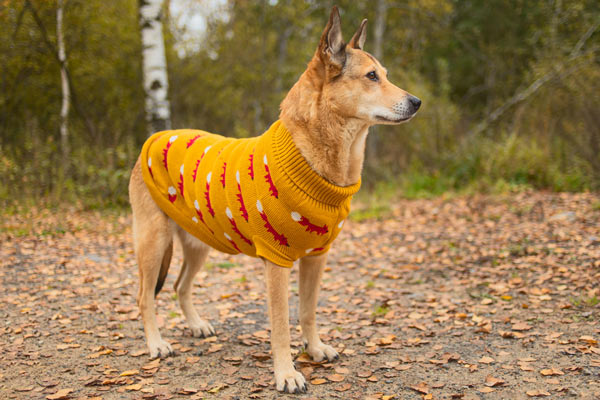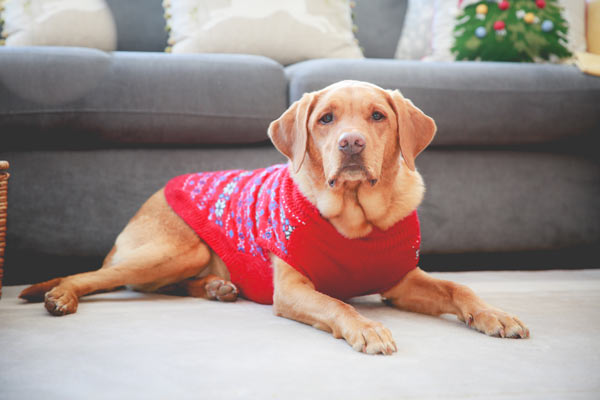Sweaters for Dogs: How to Keep Your Pup Warm and Comfortable in Cold Weather

As the temperature drops, it's important to consider how the weather might be affecting your furry friend. While we bundle up in cozy sweaters, some dogs also need extra protection from the cold. Dog sweaters are more than just a fashion statement—they play a vital role in keeping your dog warm, comfortable, and healthy during the colder months.
In this article, we'll explore:
- Why some dogs may need sweaters
- How to choose the right one
- Tips for helping your dog adjust to wearing clothes
- Important safety considerations
Why Some Dogs Need Sweaters
Different dogs have varying levels of tolerance for cold weather. Certain factors, such as breed, age, size, and coat type, can make some dogs more vulnerable to the cold than others. Here's why your dog might benefit from a sweater:
1. Short-Coated or Hairless Breeds
- Breeds like Greyhounds, Chihuahuas, and Whippets have thin coats and little body fat, making them more sensitive to cold temperatures.
- Hairless breeds, such as the Chinese Crested and Xoloitzcuintli, need extra protection in cooler weather.

2. Small or Toy Breeds
- Small breeds like Pomeranians, Yorkies, and Dachshunds lose body heat quickly and may feel the cold much sooner, even during short outings.
3. Senior Dogs
- Older dogs may struggle to regulate their body temperature and experience joint pain or arthritis that worsens in the cold. A sweater provides warmth and comfort.
4. Sick or Recovering Dogs
- Dogs recovering from surgery or illness, or those with compromised immune systems, may struggle to maintain body heat. A sweater can support a smoother recovery.
5. Cold-Sensitive Dogs
- Even thick-coated dogs, like Poodles or Labradors, may be sensitive to colder temperatures. If your dog shivers, lifts their paws frequently, or hesitates to go outside, they might need a sweater.
Choosing the Right Sweater for Your Dog
Not all dog sweaters are created equal. Here's what to consider when shopping for one:
1. Fit and Comfort
- Snug, but not too tight: The neck and chest should fit comfortably, with enough room to slip two fingers between the sweater and your dog's skin.
- Appropriate length: The sweater should cover your dog from neck to tail without dragging or restricting movement.
- Freedom of movement: Ensure the armholes allow your dog to walk, run, and play freely.
2. Material
- Wool: Warm and cozy, but may irritate sensitive skin.
- Fleece: Lightweight, soft, and offers warmth without bulk.
- Acrylic/Cotton Blends: Easy to wash, durable, and less likely to irritate the skin.
Make sure the fabric is breathable to prevent overheating, and avoid materials that easily stretch out or snag.
3. Weather Protection
- Water-resistant coatings: To keep your dog dry during light rain or snow.
- Windproof layers: For added protection in windy conditions.
For cold or wet climates, you might combine a sweater with a raincoat or insulated jacket.
4. Ease of Use
- Look for sweaters with zippers, buttons, or Velcro fastenings for easy dressing and removal. Ensure closures are secure and won't irritate your dog's skin.

How to Get Your Dog Used to Wearing a Sweater
If your dog has never worn a sweater before, it might take some time for them to adjust. Here's how to help:
- Start Slowly: Let your dog sniff and explore the sweater before putting it on. Reward them with treats and praise to create a positive association.
- Short Sessions: Begin with short wear times and gradually increase as your dog becomes more comfortable.
- Supervise Closely: Watch for signs of discomfort like scratching or chewing at the sweater. Remove it if your dog seems unhappy.
Things to Watch Out for When Your Dog is Wearing a Sweater
Sweaters are great for keeping dogs warm, but there are some potential issues to keep in mind:
1. Overheating
- Even in cooler weather, dogs can overheat if they wear a sweater for too long, especially indoors or during activity. Signs of overheating include:
- Panting
- Lethargy
- Excessive drooling
Remove the sweater when indoors or in warmer environments.
2. Skin Irritation
- Sweaters that are too tight or made from irritating materials can cause skin issues. Watch for scratching, redness, or rashes.
3. Restricted Movement
- A sweater that's too tight or bulky can limit movement. If your dog is stumbling, walking awkwardly, or refusing to move, the sweater may be too restrictive.
4. Choking Hazards
- Avoid sweaters with small buttons, zippers, or embellishments that could be chewed off and swallowed.
5. Allergic Reactions
- Some dogs may be allergic to certain materials. If you notice itching, redness, or excessive licking, stop using the sweater and consult your vet.
6. Tangled Fur
- Long-haired dogs may experience matting or tangling under a sweater. Regular brushing will help prevent discomfort.
Only Have Your Dog Wear a Sweater When Supervised
It's tempting to leave your dog in a sweater for extended periods, but it's best to only have them wear it under supervision. Dogs can become uncomfortable, overheat, or get caught on something. Always remove the sweater when your dog is unsupervised, especially at night or when left alone.
Conclusion: Sweaters Are Practical—But Be Cautious
Sweaters can be a great way to keep your dog warm and comfortable during cold weather, but it's important to ensure the fit, material, and design are appropriate. Watch for signs of discomfort, overheating, or restricted movement, and always supervise your dog while they're wearing a sweater. By choosing the right sweater and monitoring your dog, you can keep them cozy and safe throughout the colder months.
Disclaimer: This website is not intended to replace professional consultation, diagnosis, or treatment by a licensed veterinarian. If you require any veterinary related advice, contact your veterinarian promptly. Information at DogHealth.com is exclusively of a general reference nature. Do not disregard veterinary advice or delay treatment as a result of accessing information at this site. Just Answer is an external service not affiliated with DogHealth.com.
Notice: Ask-a-Vet is an affiliated service for those who wish to speak with a veterinary professional about their pet's specific condition. Initially, a bot will ask questions to determine the general nature of your concern. Then, you will be transferred to a human. There is a charge for the service if you choose to connect to a veterinarian. Ask-a-Vet is not manned by the staff or owners of DogHealth.com, and the advice given should not delay or replace a visit to your veterinarian.



